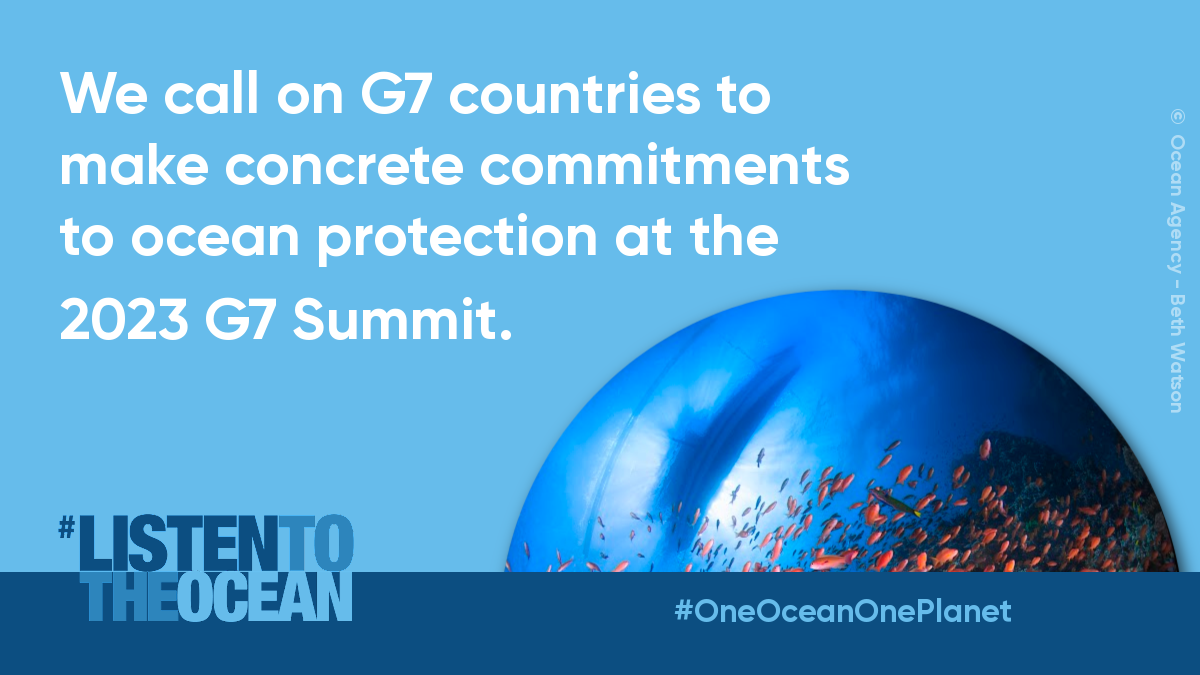The ocean community is calling on G7 governments to listen to both science and their citizens and recognize the critical importance of a healthy global ocean and resilient marine ecosystems to address climate change and deliver the Global Biodiversity Framework to protect life on our planet.
The letter, signed by 47 organisations from across the world, addresses climate and environmental ministers from G7 countries ahead of the G7 ministerial meeting on April 15-16, 2023.
The letter includes four calls to action:
- Reaffirm commitment to 2022 G7 Ocean Deal (30×30)
- Ratification and Implementation of High Seas Treaty
- Deep Sea Protection (stopping bottom trawling on seamounts and deep-sea mining)
- Designation of MPAs in Antarctica

Dear Climate, Energy and Environment Ministers of the G7,
Ahead of the G7 Ministers’ Meeting on Climate, Energy and Environment on 15-16 April, we are united in urging you to prioritize ocean action and protection on the Agenda of the 2023 G7 Summit.
All G7 governments need to listen to both science and their citizens and recognize the critical importance of a healthy global ocean and resilient marine ecosystems to address climate change and deliver the Global Biodiversity Framework to protect life on our planet. We therefore call on G7 Leaders to make concrete commitments to ocean protection at the G7 Hiroshima Summit in May.
Firstly, it is vital that G7 countries reaffirm their commitment to the 2022 G7 Ocean Deal, and agree to key follow up actions that reflect progress and developments made in the past year. This includes taking proactive steps to achieve the recently agreed Kunming-Montreal Biodiversity Target to protect at least 30% of the ocean by 2030 (the 30×30 target), just seven years away.
Secondly, G7 countries must support the ratification and implementation of the landmark new ‘High Seas Treaty’ to ensure the conservation and sustainable use of marine biological diversity of areas beyond national jurisdiction. Following the historic agreement over this legally binding instrument on 4 March 2023, it is now critical that all G7 countries commit to ratify the Treaty as soon as possible, and to work with other countries to swiftly secure the 60 ratifications needed for the Treaty to enter into force. Ideally, this should be achieved in time for the UN Ocean Conference to be held in France in June 2025. G7 members must also commit to ensuring adequate funds are available to support developing countries with the resources and capacity needed to effectively implement the Treaty. As an essential component to meeting the 30×30 target, G7 members should agree to work together to support the protection of key high seas areas once the Treaty has entered into force.
Thirdly, G7 countries must look to the future and take decisive action to protect the deep ocean and the vital ecosystem services it provides, including carbon sequestration and storage. It is imperative that all G7 countries safeguard the health of the deep sea from destructive extraction by urgently calling for a moratorium on deep-sea mining and a prohibition on bottom trawling on seamounts and other vulnerable marine ecosystems in the high seas. In addition, and in line with the precautionary principle, G7 countries must commit to taking a precautionary approach to deep-sea carbon capture and storage technologies until the environmental, social and economic risks are comprehensively understood.
Finally, we call on the G7 countries to work together to break the impasse over the designation of Marine Protected Areas (MPAs) in Antarctica’s waters through the Commission for the Conservation of Antarctic Marine Living Resources (CCAMLR), an important step towards meeting the 30×30 target and their biodiversity commitments. A special CCAMLR meeting will take place in Santiago, Chile from 19-23 June, dedicated to ensuring progress for three Antarctic MPA proposals in the East Antarctica, the Weddell Sea, and the Antarctic Peninsula. After years of deadlock, it is essential that the six G7 countries that are members of CCAMLR (France, Germany, Italy, Japan, the UK, and the US), as well as the EU, commit to continue working together to secure full support for designating these MPA proposals is obtained at CCAMLR this year.
Strong commitments to protect the ocean must be included both in the Summit Agenda and in the Communiqué adopted by the G7 Leaders. This will demonstrate that the G7 is ready to take the lead towards meeting global commitments to combat the climate and biodiversity crises.
We hope that G7 leaders will champion ocean protection at the G7 Summit and commit to actions vital for the health of all people and the future of our planet.
Signed,
Antarctic and Southern Ocean Coalition
Benioff Ocean Science Laboratory
Blue Green Future, LLC
Blue Ventures
Canadian Parks and Wilderness Society (CPAWS)
Civil Society Forum of Tonga
David Suzuki Foundation
Deep Sea Conservation Coalition
Deep Sea Mining Campaign
Deutsche Stiftung Meeresschutz
Deutsche Umwelthilfe e.V.
ecOceanica
Friends of the Earth Japan
Fundación Montescola
Gallifrey Foundation
Global Ocean Trust
High Seas Alliance
International Fund for Animal Welfare (IFAW)
KYMA sea conservation & research
Mar Azul Uruguayo
Marine Conservation Institute
Marine Conservation Society
Marine Watch International
MERI Foundation
Mineral Inheritors Rights Association
MiningWatch Canada
Nature Canada
Oceancare
Ocean. Now!
oceans aware
Oceans North
Only One
Pan African Vision for the Environment (PAVE)
Project Everyone
Sciaena
SeaLegacy
Sharkproject International
Sustainable Ocean Alliance
Te Ipukarea Society
The Ocean Foundation
The Ocean Project
Turkish Marine Research Foundation
West Coast Development Foundation
West Coast Environmental Law
Whale and Dolphin Conservation
Women4Oceans
